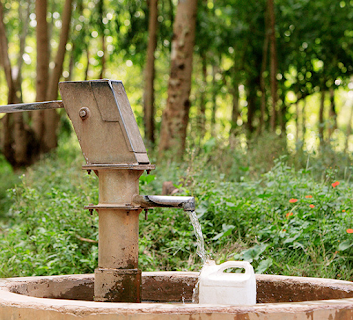Is groundwater the key to environmental change in Africa?
This post will explore the effects of environmental change on groundwater and groundwater recharge rates, their relationship with climatic regions, land-use change, agriculture and finally discuss how they might be incorporated into adaptive strategies to climate change in Africa.
Roughly 50% of Africa’s population relies on groundwater stores as their main water supply, placing groundwater at the center of the water and environmental change in Africa discussion. It has already been established that annual runoff and groundwater recharge are more sensitive to the distribution of rainfall events, rather than the total annual runoff. Recharge rates have a positive response to extended and moderate rainfall events, and a negative response to both extreme rainfall events (high flood risk) or low intensity rainfall (increased evaporation rate). As discussed in the last blog post, climate change is projected to cause extreme weather events, such as more intense rainfall that will occur more scarcely and be likely followed by droughts. Therefore, climate change could severely damage groundwater recharge rates, especially in arid and semi-arid regions of Africa.
On the other hand, a different study has shown that in certain climates
groundwater recharge benefits from more intense rainfall events as opposed to
moderate ones. The study details how in wet regions of Africa groundwater
stores are recharged through rainfall infiltrating the soil, at a consistent
rate and over large areas, however, in dry regions groundwater stores recharge
locally from temporary streams and ponds which flow only during intense
rainfall events. This suggests that groundwater stores could benefit from the
intensification of rainfall events and become more sustainable as they could be
replenished more regularly.
Environmental change could also benefit groundwater recharge in the
tropical regions of Africa. Studies suggest that in tropical regions
groundwater stores do not recharge unless the monthly rainfall or seasonal
rainfall exceed the norm due to the intense amount of evapotranspiration. Therefore,
the intensification of rainfall, driven by climate change, could represent positive
feedback by overcoming monthly and seasonal rainfall threshold needed for
groundwater recharge in the tropics.
Additionally, land-use changes can cause potential positive feedback on groundwater recharge rates. Shifting from natural vegetation to agricultural land, which replaces deep-rooted vegetation with short-rooted crops, has been shown to increase the water table level considerably (up to 2.3m/year) despite periods of severe drought.
All things considered, while groundwater might benefit from this particular climatic change, other sectors certainly will not. For example, agriculture will be negatively impacted by extreme rainfall events. Besides destructive floods, a study has shown that at two sites in India, with roughly the same amount of annual rainfall the crop yield varied drastically. Crop yield increase was positively correlated with moderate rainfall that occurred regularly throughout the year, and negatively with intense rainfall events happening less frequently and followed by drought periods.
Adaptive strategies could focus on determining how reliable the groundwater stores will be within these intense rainfall replenishment conditions, and perhaps this could alleviate crop failure during droughts and become a more sustainable water supply.



Your posts are well-written and demonstrate a sound grasp of water and environmental change issues in Africa. It shows that you have done extensive reading and a thorough understanding of the literature consulted with the adoption of the suggested referencing format. This argument “I would argue that this portrays climate change as something that will come to pass in the FUTURE and takes away from acknowledging the urgency of its effects that are happening NOW” is insightful.
ReplyDeleteHowever, your claim that “land-use changes have also been identified as potential positive feedback on groundwater recharge rates” can be misconstrued in the absence of evidence to illustrate your claim. For instance, a deforestation is a form of land use change, which promotes carbon emission but also increases food production (in some cases), hence a “potential positive feedback on groundwater recharge rate”. In the absence of empirical evidence in the form of a case study, this point can be misrepresented as promoting deforestation, hence climate change.
The point about climate change actually leading to net increase of a water resource in tropical Africa is very poignant! I wonder if there are regional initiatives to encourage proliferation of land use changes that encourage groundwater replenishment, or even just to increase reliance on groundwater use to supplement falling precipitation rates? Excited to see how your blog progresses!
ReplyDelete